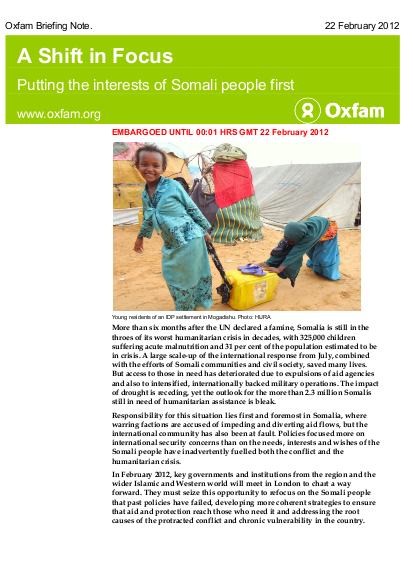
More than six months after the UN declared a famine, Somalia is still in the throes of its worst humanitarian crisis in decades, with 325,000 children suffering acute malnutrition and 31 per cent of the population estimated to be in crisis. A large scale-up of the international response from July, combined with the efforts of Somali communities and civil society, saved many lives. But access to those in need has deteriorated due to expulsions of aid agencies and also to intensified, internationally backed military operations. The impact of drought is receding, yet the outlook for the more than 2.3 million Somalis still in need of humanitarian assistance is bleak. Responsibility for this situation lies first and foremost in Somalia, where warring factions are accused of impeding and diverting aid flows, but the international community has also been at fault. Policies focused more on international security concerns than on the needs, interests and wishes of the Somali people have inadvertently fuelled both the conflict and the humanitarian crisis. In February 2012, key governments and institutions from the region and the wider Islamic and Western world will meet in London to chart a way forward. They must seize this opportunity to refocus on the Somali people that past policies have failed, developing more coherent strategies to ensure that aid and protection reach those who need it and addressing the root causes of the protracted conflict and chronic vulnerability in the country.
Resource collections
- Droughts
- Evaluating humanitarian action
- Learning from crises
- Monitoring and Evaluation (M&E)
- Monitoring of humanitarian action
- Somalia humanitarian response
- Topics
- UN Habitat - Urban Response Collection
- Urban Response - Urban Crisis Preparedness and Risk Reduction
- Urban Response Collection - Community Engagement and Social Cohesion
- Urban Response Collection - Economic Recovery
- Urban Response Collection - Environment and Climate Change
- Urban Response Collection - Housing, Land and Property
- Urban Response Collection - Urban Crisis Response, Recovery and Reconstruction
- Urban Response Collection - Urban Resilience
- Use of evaluation evidence
